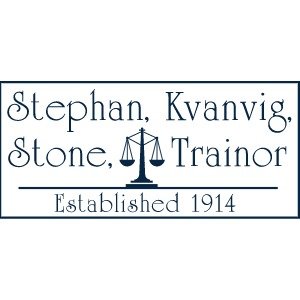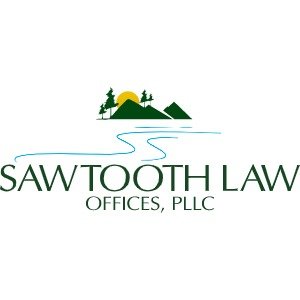Best Tax Increment Financing Lawyers in Idaho
Share your needs with us, get contacted by law firms.
Free. Takes 2 min.
Or refine your search by selecting a city:
List of the best lawyers in Idaho, United States
About Tax Increment Financing Law in Idaho, United States
Tax Increment Financing, often referred to as TIF, is a public financing method commonly used by local governments in Idaho to stimulate economic development. Through TIF, municipalities can fund infrastructure and community improvement projects by capturing the increased property tax revenue generated by those projects. In Idaho, TIF is typically administered via urban renewal agencies under state law. These agencies identify specific areas, known as Urban Renewal Districts, where redevelopment is needed. The idea is that public investment in these districts will increase property values, and the resultant growth in tax revenues will be used to pay off the costs of the initial improvements.
Why You May Need a Lawyer
Tax Increment Financing can be legally complex, involving multiple parties, investment arrangements, and compliance with state and local statutes. Here are some common situations in which consulting a lawyer is beneficial:
- Navigating the process of establishing, amending, or dissolving a TIF district
- Understanding TIF documentation and agreements, including redevelopment plans and financing terms
- Resolving disputes over property valuations, assessments, or project eligibility
- Ensuring compliance with Idaho’s Urban Renewal statutes, ethical standards, and public notice requirements
- Representing affected property owners or objectors to a proposed TIF district
- Negotiating or reviewing public-private partnership arrangements
- Assisting municipalities or developers in obtaining necessary approvals from public agencies
- Defending or challenging legal challenges related to TIF projects in court
Local Laws Overview
Tax Increment Financing in Idaho is governed primarily by Title 50, Chapter 20 of the Idaho Code, which covers Urban Renewal Law, and Title 50, Chapter 29, which discusses Local Economic Development Act provisions. Urban renewal agencies are the primary entities authorized to implement TIF. These agencies must follow a process that includes preparing an Urban Renewal Plan, conducting public hearings, identifying a revenue allocation area, and obtaining approval from the local municipality.
Key aspects of Idaho’s TIF laws include:
- Strict procedural requirements for creating, amending, or terminating TIF districts
- Limitations on the duration of revenue allocation areas (usually capped at 20 years)
- Mandated public participation, hearings, and transparency through published notices
- Requirements to demonstrate “blight” or underdevelopment as a justification for TIF
- Annual reporting and audit obligations by urban renewal agencies
- Coordination with affected taxing districts and compliance with state constitutional requirements for public spending
Frequently Asked Questions
What is Tax Increment Financing and how does it work in Idaho?
TIF is a redevelopment tool where increases in property tax revenue from a defined area are set aside to pay for public improvements in that area. In Idaho, urban renewal agencies create TIF districts, and the growth in property values and taxes within that district funds the improvements.
Who oversees TIF projects in Idaho?
Urban renewal agencies, established by local governments, are responsible for creating and managing TIF districts. These agencies operate under state laws and must report to local elected officials and the public.
How are properties selected for inclusion in a TIF district?
Properties are selected based on criteria such as the presence of blight, underdevelopment, or need for economic revitalization. A detailed plan identifying the area and its needs is developed and must go through a public review process.
Can TIF be used for any type of development?
No, TIF funds are typically restricted to public infrastructure, environmental remediation, and other expenses listed in Idaho’s Urban Renewal statutes. Each project must conform to the approved Urban Renewal Plan.
Do property owners inside a TIF district pay higher taxes?
Property owners do not face higher tax rates. However, the incremental increase in tax revenue resulting from higher property values is diverted to the urban renewal agency to pay for the improvements rather than going to other taxing districts.
How long does a TIF district last in Idaho?
Most TIF districts in Idaho have a duration limit of up to 20 years, although this can vary depending on the terms set forth during creation and the size and scope of the project.
Can TIF affect local schools and other public services?
Yes, because the increment in property tax revenue is diverted to the TIF fund rather than other taxing entities, it can impact the amount of money available to schools, libraries, and other services unless additional arrangements are made.
How can the public participate in the TIF process?
Public participation is required by law and usually includes public hearings, the opportunity for comments, and published notices regarding the formation and amendment of TIF districts.
What happens if a TIF project does not produce the anticipated increase in revenue?
If property values and tax revenues do not grow as expected, funding for improvements may fall short. Urban renewal agencies must address any gaps, sometimes by reducing project scope or seeking alternative financing.
Can decisions related to TIF be challenged?
Yes, affected parties including property owners or concerned citizens may legally challenge the formation, modification, or operation of a TIF district if they believe procedures were not followed or laws were violated.
Additional Resources
For further information or assistance regarding Tax Increment Financing in Idaho, the following resources may be helpful:
- Idaho Urban Renewal Association
- Idaho State Legislature - for access to Idaho Codes
- Local city or county planning departments
- Idaho Attorney General's Office
- Idaho Tax Commission
- Public meetings and hearings on urban renewal projects
Next Steps
If you believe Tax Increment Financing may impact you, or if you are involved in the creation, administration, or opposition of a TIF district in Idaho, it is recommended to:
- Document your concerns and gather any relevant documents or notices
- Consult with a qualified attorney who has experience with Idaho municipal and redevelopment law
- Contact your local urban renewal agency for detailed information about active or proposed districts
- Participate in scheduled public hearings or information sessions
- Research state and local codes to better understand your rights and obligations
A legal professional can review your situation, explain your options, and help protect your interests in any Tax Increment Financing matter in Idaho.
Lawzana helps you find the best lawyers and law firms in Idaho through a curated and pre-screened list of qualified legal professionals. Our platform offers rankings and detailed profiles of attorneys and law firms, allowing you to compare based on practice areas, including Tax Increment Financing, experience, and client feedback.
Each profile includes a description of the firm's areas of practice, client reviews, team members and partners, year of establishment, spoken languages, office locations, contact information, social media presence, and any published articles or resources. Most firms on our platform speak English and are experienced in both local and international legal matters.
Get a quote from top-rated law firms in Idaho, United States — quickly, securely, and without unnecessary hassle.
Disclaimer:
The information provided on this page is for general informational purposes only and does not constitute legal advice. While we strive to ensure the accuracy and relevance of the content, legal information may change over time, and interpretations of the law can vary. You should always consult with a qualified legal professional for advice specific to your situation.
We disclaim all liability for actions taken or not taken based on the content of this page. If you believe any information is incorrect or outdated, please contact us, and we will review and update it where appropriate.
Browse tax increment financing law firms by city in Idaho
Refine your search by selecting a city.















